

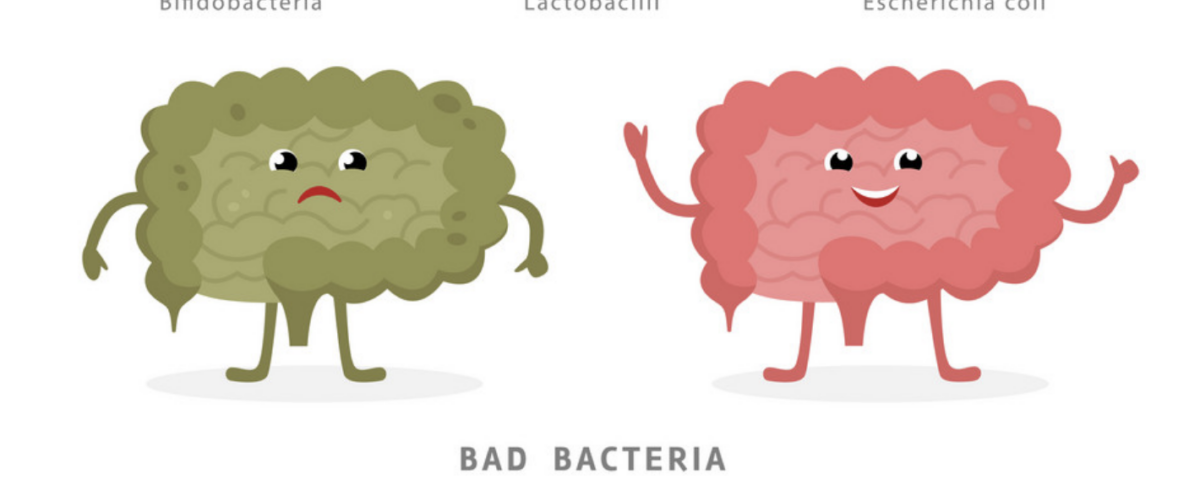
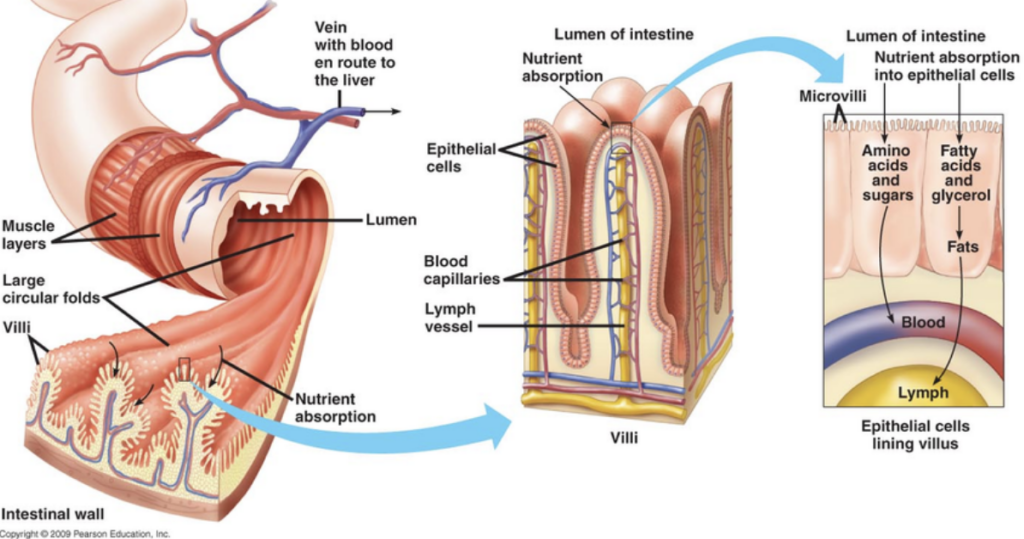
We will investigate is how our intestinal health affects our brain function, mood, weight control, immune system and almost every other body system and diseases process.
What is leaky gut?
It is likely you have heard of leaky gut- but why? What is it and how does it actually affect our day to day lives?
Leaky gut is increased permeability of our intestinal barrier.
Firstly, to understand what leak gut is, we should review briefly what the gastrointestinal (GI) tract is. The GI tract is a massive organ system which has a lot of exposure to the outside world. It is home to the main organs that digest our food and allows nutrients break down so we can utilize it as energy in our cells. Digestion is a very in-depth process where different enzymes are secreted in the GI tract to break apart Carbohydrates, Fats and Protein we ingest, starting in the mouth and ending at the anus. This is a vital role in our body but is just one of the roles our gut microbiome serves our bodies.
The GI tract and the microbia that inhabit it, is our defence system 1
The human gastrointestinal tract is a diverse microbial community which is composed of hundreds of microbial species 2, 3. And it is one of the largest interfaces (250–400 m2) between the host, environmental factors and antigens in the human body 2 .The number of microorganisms inhabiting the GI tract has been estimated to exceed 1014, which encompasses∼10 times more bacterial cells than the number of human cells. 2
The Intestine is a sensory organ: It is connected to the brain, endocrine and immune systems.
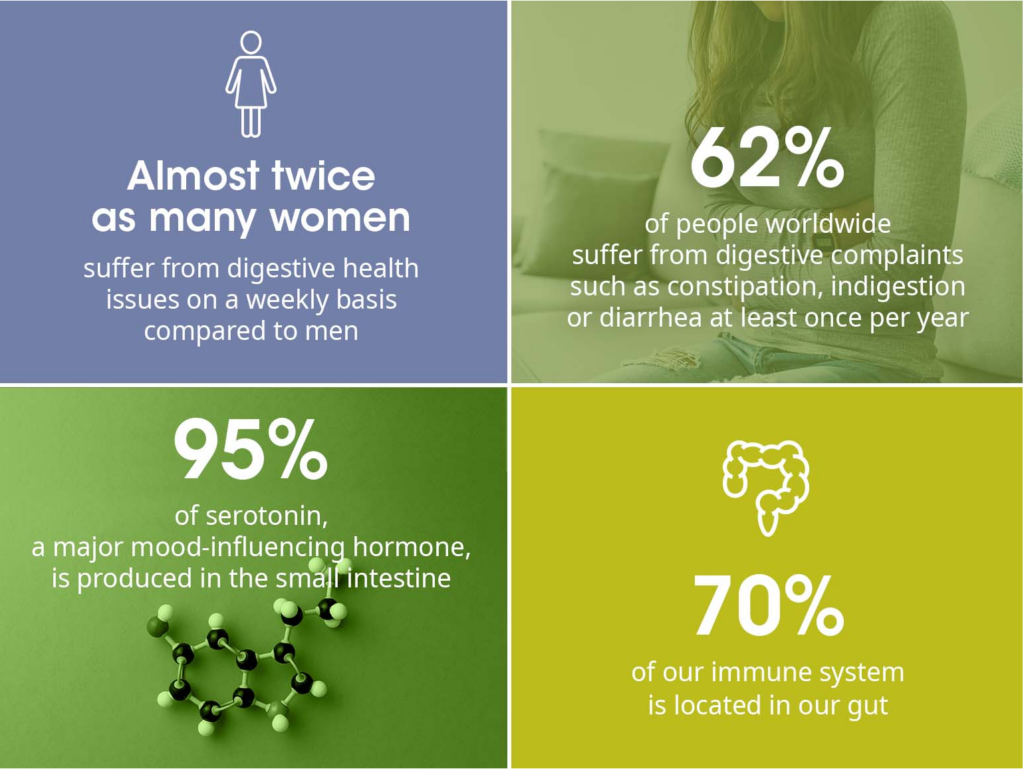
Approximately 70% of our immune system is located in the intestine, this is the system that notifies the rest of our body of an intruder and creates a reaction 2 .
Approximately 95% of serotonin is created in the intestine and it is the neurotransmitter, chemical or hormone (there are many opinions on this), but it is responsible for mood and behaviour and is produced mainly in the intestines – is made from the essential amino acid tryptophan 4. Serotonin has critically important functions in many human organ systems outside the brain, including the regulation of energy balance and food intake, GI tract functioning, as well as vital processes of the heart and lungs 4 .
Hundreds of thousands of endocrine cells, producing numerous hormones, are dispersed among the epithelial cells and surface of the intestine and react to changes in gut contents by releasing hormones that are, in general, targeted to other parts of the digestive system 29.
Our microbia balance can be related to immune system function2 and
the development of diseases like breast 1 and bowl cancer, IBD (Crohns, Ulcerative colits) 5,
depression 6 , obesity, diabetes, HIV and autism 7, 8, 9 .
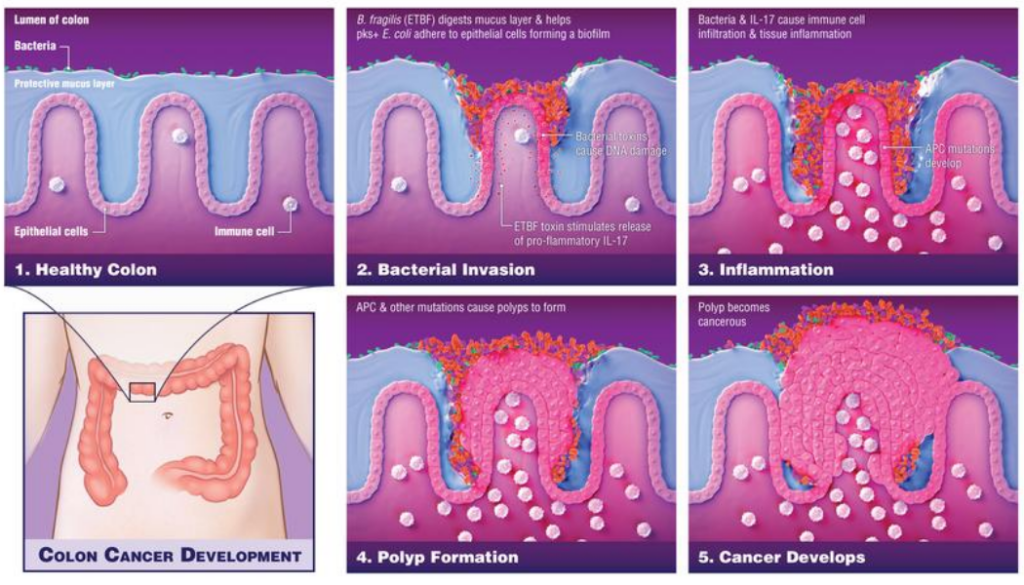
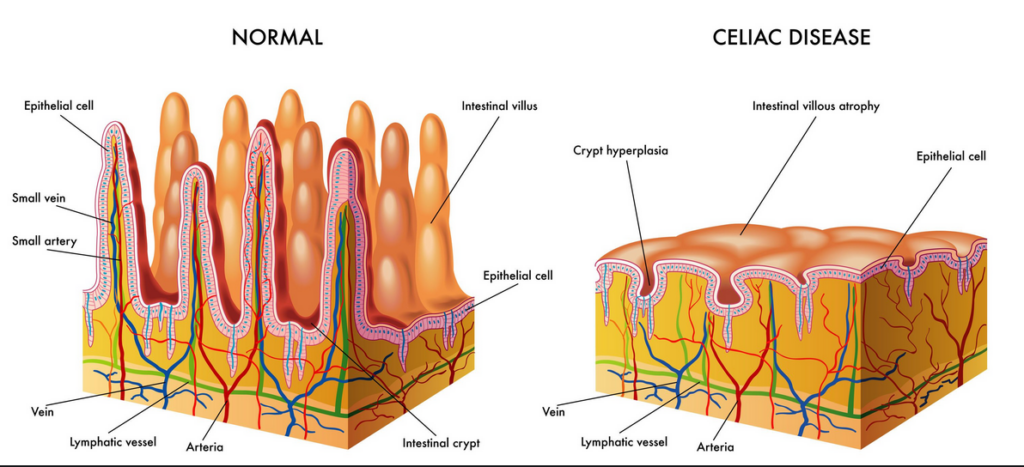
DYSBIOSIS – this term means the imbalance of our gut microbiome which creates a ripple effect of the following:
Sugar:
It is well-demonstrated that diets high in fat and/or sugar destroy the intestinal microbia, leading to dysbiosis and increased production of endotoxins 5, 9 . Sugars and endotoxins create an environment where opportunistic fungus can over grow (like Candida Albicans). It is more difficult for our healthy microbia (normal flora) to maintain a barrier when there is imbalance.
Antibiotics:
Recent studies showed antibiotics and the opportunistic fungus candida are directly related to the breakdown of healthy microbia, the development leaky gut and the infiltration of Candida into the systemic system 12-15. Pathogens exploit the sugars, radicals, and oxygen occurring as a result of disruption of intestinal microbiota and the host inflammatory response induced by antibiotic treatment (Yoon, 2018). Antibiotics also help unhealthy pathogens create their own mucus (biofilms), so it is harder to destroy them (notice mucus in your stool?) 12-15. Antibiotics also can increase the amount of oxygen in the gut (where is not normally so high in health people) and this creates a better environment for Candida to proliferate16 .
Candida alterations in the levels of gut metabolites as a result of antibiotic treatment correlate to increased growth and hyphae formation of Candida. albicans inhabiting the GI tract 13 . Candida likes to inhabit several systemic areas including our mucosal tissues, skin and urinary/genital systems. This opportunistic fungus (which overgrows due to excess sugar, antibiotics and other drug intake) is known to develop ‘hyphae’ which are finger like extensions that breach the protective barrier of the intestinal flora and invade our systemic system and has been linked to many GI diseases like Crohn’s 17.
Other Drugs:
Opioids 10, 18 and steroids 14 are also known to cause dysbiosis with similar pathologies as antibiotics. They also allow overgrowth of opportunities fungus and cause increased permeability to the microbial barrier.
After reading numerous articles, I have concluded that leaky gut is a bad chain reaction. Leaky Gut or varied levels of Dysbiosis, occurs when the microbiome is compromised. Our microbiota is damaged by drugs, sugar and other inflammatory causing toxins and the protective barrier is no longer able to prevent pathogens from breaching the barriers- this allows overgrowth and hyphae of pathogenic endogenous microorganisms (eg. Candida), as well as a free passage for viruses, bacteria or other opportunistic pathogens to enter into our blood stream or lymphatic tissue. From here, pathogens have an uninterrupted access to all our body tissues – which causes inflammation and immune responses (where it normally wouldn’t). This exaggerated and unregulated inflammatory and immune responses infiltrates and eventually alters our cells and the DNA inside – which is related to cancer, depression, autism and autoimmune diseases.
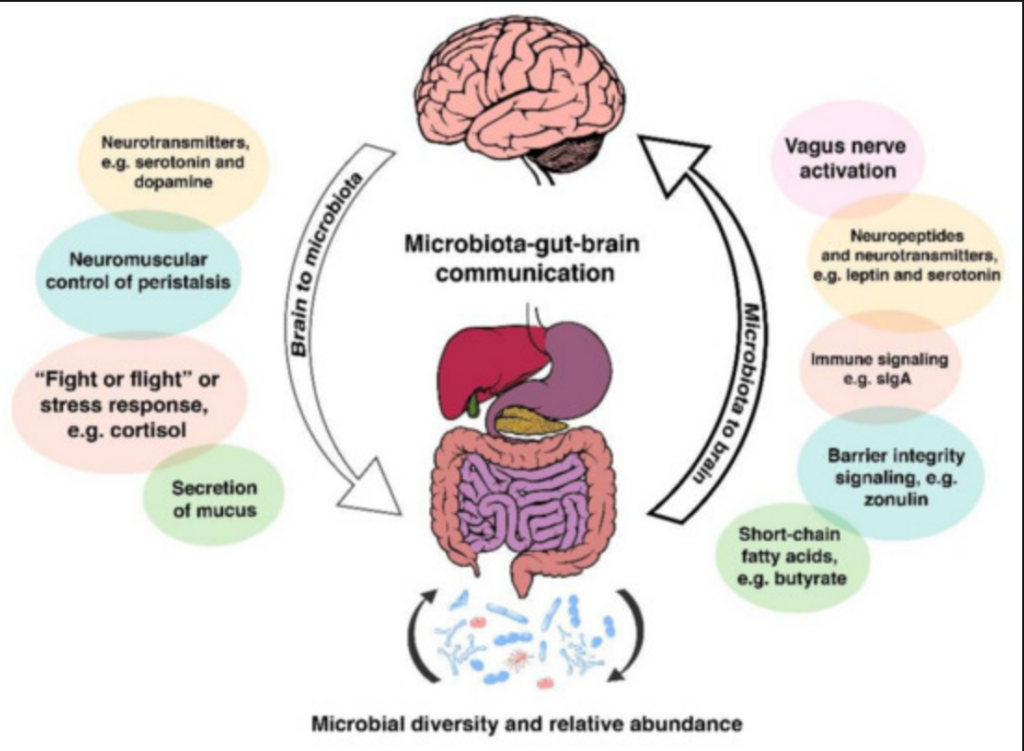
BUT we can do something about it
When people talk about ‘boosting’ your immune system- they are not actually talking about making more immune cells (this actually happens when you are exposed to an antigen/pathogen – this is a huge topic). They are talking about boosting your intestinal gut flora and protective barrier with foods that your microbia like to eat (prebiotics) and adding to your healthy flora (probiotics) and preventing compromise (avoiding sugar, antibiotics, steroids, opioids, stress, maintaining a balancing diet, etc).
The intermediate metabolite of probiotics act like short-chain fatty acids and can make the growth of intestinal epithelial cells more active 19 . Probiotics can speed up the normal function of intestinal mucosal barrier, keep the integrity of intestinal cells, adjust the growth and reproduction of gastrointestinal bacteria through repairing the intestinal mucosal injury resulted from virus infection to relieve intestinal flora disturbance, reduce the diarrhea frequency and the risk of secondary bacterial infection 19.
Probiotics have enzymes which can decompose the substances which the human cannot digest or has difficulty in digestion 19. In a very recent study, it shows Probiotics that have antibiofilm activity, it prevents unhealthy ‘biofilms’ (mucous covering gut epithelial cells – that prevents invasion) 20. Current research on probiotics, as a food supplement in addition to a Mediterranean diet, showed that probiotics (such as Lactobacillus Rhamnosus) changes the composition of the microbiota, thus allowing the return to eubiosis (normal balance) 21.
Prebiotics are carbohydrate fibre that feed our healthy bacteria or normal flora! Prebiotics differ from probiotics, as they are not the healthy bacteria, but instead what the healthy bacteria we already have likes to eat! Some examples include leeks, artichoke, garlic and onion, bananas, asparagus, legumes and dandelion greens.
Prebiotics sometimes called MACs (microbiota-accessible carbohydrates) are non-digestible (by the host) food ingredients that have a beneficial effect through their selective metabolism in the intestinal tract 22. The gut microbia is then allowed to metabolize (feed off) these prebiotics and make short chain fatty acids (Butyrate, acetate and propionate). Increasing the butyrate production enhances the protection of the epithelium through strengthening the mucosal barrier through increased specific protein production, as well as through decreasing permeability (leak gut) and bacterial systemic spread 23. Short chain fatty acids are involved in the colonic homeostasis, stimulating the growth and development (proliferation and differentiation) of healthy epithelial cells, the absorption of salts and water, the maintenance of mucosal integrity, and decrease of inflammation 24.
Sugars create an optimal environment for imbalance of our microbiome and pathogens like parasites and Candida love to eat sugar. There is evidence that gluten can be associated with leaky gut (increased permeability of the intestinal wall)25. Also, like sugar, gluten can help those unhealthy bacteria – or the overgrowth of fungus move faster into the systemic system25. Celiac disease is a chronic condition where the villa (intestinal wall extensions) that help grab onto and digest our food are flattened and the surface area of the intestine is more exposed. (see picture)
Proteins from plant sources like peas and legumes have been shown to support health gut bacteria 26. However, proteins from red meat and dairy have been associated with increased risk of Irritable bowel syndrome/disease 27. There is conflicting evidence on soybean effect on gut microbia. Raise your tryptophan to promote more serotonin development! Some examples include salmon, tofu, eggs, pineapples, nuts and seeds, turkey.
Healthy fibre intake is associated with anti-inflammatory effects 21 . The modern western diet causes an Omega 6 > Omega 3 imbalance and has contributed to significant changes in the gut microbiome and has been linked to Metabolic endotoxemia (cause of chronic inflammation) 8. Findings uncover an interaction between host tissue fatty acid composition and gut microbiota as a novel mechanism for the anti-inflammatory effect of omega-3 fatty acids. Enhance your intake of Omega 3: salmon, fish oils and reduce Omega 6: Cooking oils 8.
When we are internally stressed, our brain tells our body to secrete cortisol (which should really only be secreted in fight or flight situation- but our bodies cannot differentiate). This reaction can have the same detrimental effects on the body and brain that taking steroids or other drugs have (chronic inflammatory and immune responses).
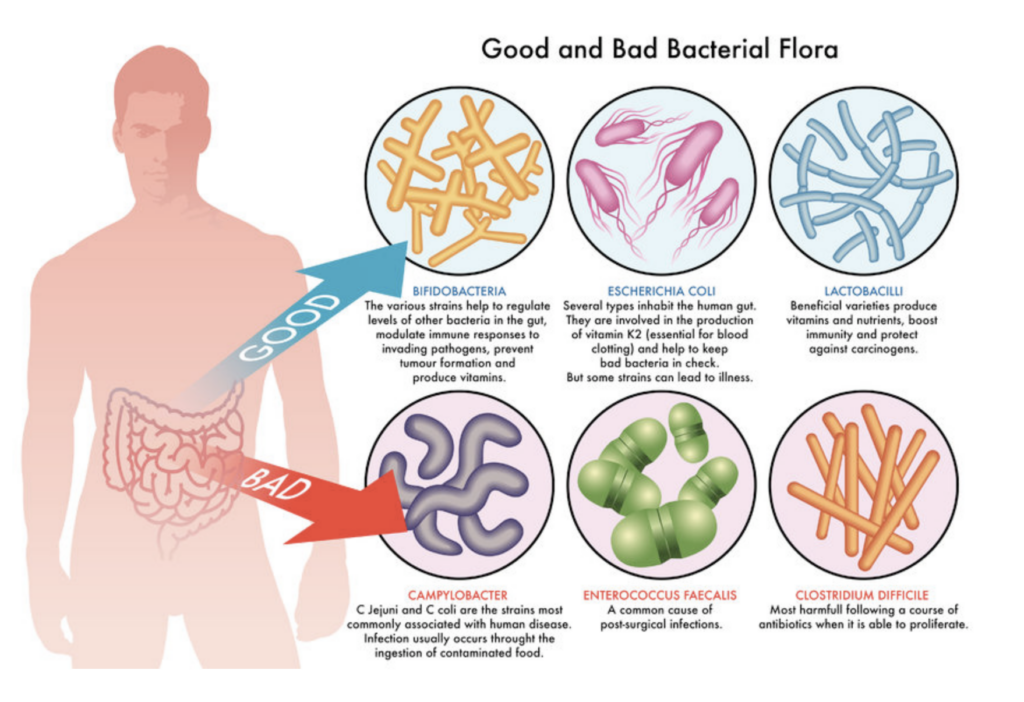
Summary
A healthy host–microorganisms balance must be respected in order to optimally maintain the intestinal barrier and immune system functions and, consequently, prevent disease 24. Everything from chronic disease to our mood are related to what is happening in our gut- which is DIRECTLY related to what we put in our bodies. It has been suggested that the reasons we don’t get more cancer is related to our microbial barrier 28 – it is our natural tumor suppressant!! What we put in matters!
If you want to learn how to improve this VITAL barrier, come join our GUT HEALTH TALK! Take an hour and enjoy a green smoothie. Add to your repertoire of health tools you will be able to take forward in your life to be healthier, happier and stronger!!
Thank you (and thank yourself) for reading!
Kaley Johnson
RN BN MN CNC 200YTT
If you would like to know the specifics of this diet or if you have questions about your health, please subscribe to the monthly health advice at www.vitalityhealthsolutions.org and find the solutions to your health concerns.
REMINDER: It is shown in metanalysis (the most credible type of research) shows that communal accountability, social support and dietary support has the ability to increase adherence to a diet or wellness program.
(Lemstra, M., Bird, Y., Nwankwo, C., Rogers, M., & Moraros, J. (2016). Weight loss intervention adherence and factors promoting adherence: a meta-analysis. Patient preference and adherence, 10, 1547.)